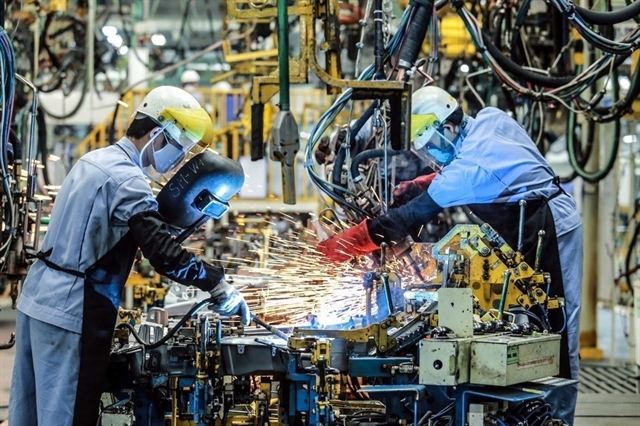 Economy
Economy


|
| Japan-invested Toyota Việt Nam in Vĩnh Phúc Province. Establishing linkage between foreign-invested and domestic firms was important to promoting economic reforms. — VNA/VNS Photo Danh Lam |
HÀ NỘI — Institutional reforms will continue to be the major growth driver in 2020 and beyond, while a focus would be placed on removing barriers and connecting firms to establish value chains, Chairman of the Việt Nam Chamber of Commerce and Industry Vũ Tiến Lộc said.
Entering 2020, the Government showed determination in pushing for reforms, with the promulgation of Resolution No 2 on the first day of the year, which targeted to lift the country’s ease of doing business ranking by the World Bank by 10 spots, from the current 70th position.
Lộc noted that the business climate of Việt Nam still faced problems, as around 60 per cent of firms did not report profits, while imports and exports were heavily dependent on several markets.
Uncertainties in global markets and the slowdown of the global economy were also concerns, he pointed out.
Internal pressure from the central Government, external pressure from integration and expectations of residents would give major impetus to reforms, he said.
Strengthening institutional reforms was a top priority for 2020 and many years to come, Lộc said. “The key words for reforms this year should be ‘remove’ and ‘connect’,” he said.
Specifically, it was critical to remove barriers for businesses so as to promote investments and connect small- and medium-sized enterprises (SMEs) with foreign direct investors, especially in the circumstance of the Fourth Industrial Revolution (Industry 4.0) and the effects of free trade agreements.
Connecting foreign-invested companies with domestic firms should be considered an indispensable criterion in selecting new-generation FDI inflow, which reflected the corporate responsibility of FDI companies to their second home, Lộc said. He also said that this would be the way to promote sustainable development of FDI in Việt Nam.
Five proposals
VCCI gave five proposals to boost reforms this year.
Lộc said that firstly, priority should be placed on tackling overlaps and inconsistencies in the legal system regarding investment, business, construction, land, environment, housing and bidding.
VCCI recently revealed at least 25 points that showed overlaps and inconsistencies among legal documents, which were existing as the biggest barrier to business and investment.
Secondly, it was important to hasten simplification and removal of business prerequisites and checks before import/export to reduce cost and time for businesses.
The Government targeted to reduce at least 20 per cent of procedures as well as cut time and costs for businesses in 2020.
Thirdly, firms also hoped the digitalisation and development of e-Government be sped up.
In addition, the process of transferring public services to the private sector to supply should be promoted.
Last but not least, it was important to decentralise power.
The five-point reforms would be a major growth driver, Lộc said.
VCCI also proposed amendments to laws on enterprise, investment and public-private partnership should be developed with a new mindset and completed for approval.
It was important to regulate business households as sole proprietorship to promote development and improve efficiency of the sector, which contributed up to 30 per cent of gross domestic product.
Lộc said that a law on supporting auxiliary industry development should also be passed to promote the linkage between FDI and domestic firms to establish value chains. — VNS




